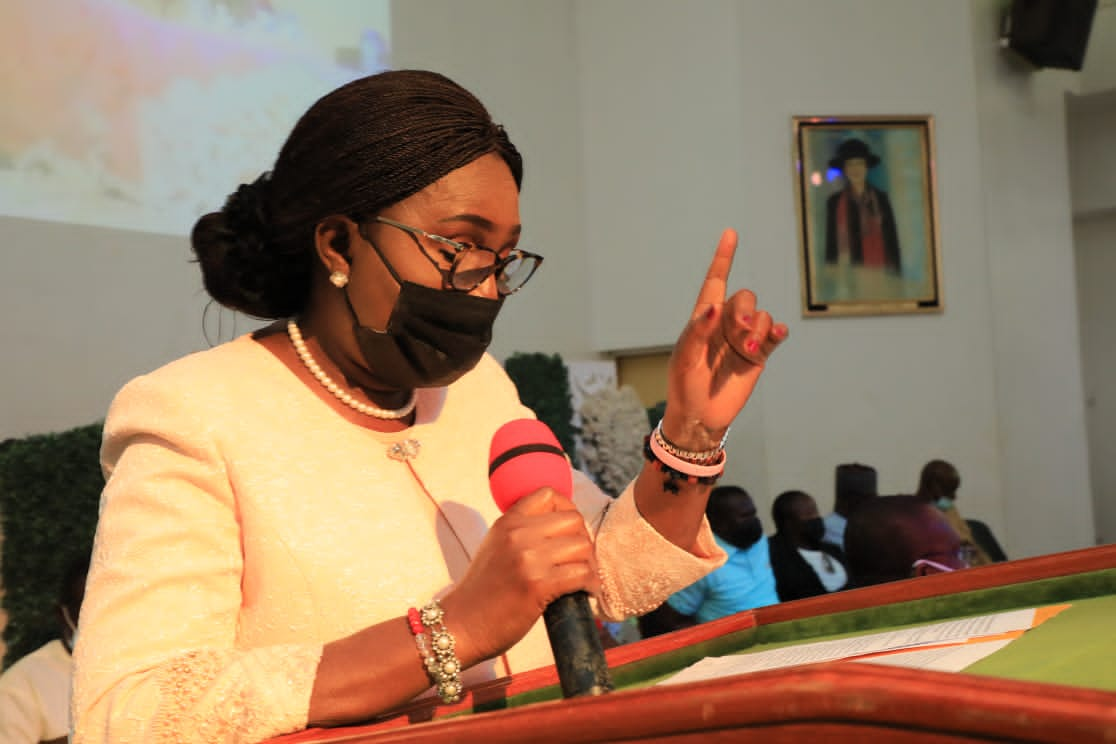A SPEECH DELIVERED BY THE FIRST LADY OF ONDO STATE, CHIEF MRS BETTY ANYANWU-AKEREDOLU, AT THE 4TH ANNUAL NANO CONFERENCE THEMED APPLICATION OF NANOTECHNOLOGY TO ENERGY, ENVIRONMENT, AGRICULTURE AND HEALTH HELD AT THE UNIVERSITY OF NIGERIA, NSUKKA, 19TH-23RD JULY, 2021.
Salutation………..
I am very pleased to be in your midst today on this auspicious occasion of the 4th Annual Conference organized by the Nano Research Group of the University of Nigeria, Nsukka (UNN). I consider it a great privilege to be the Special Guest of Honour at such a high profile event that is well attended by top academics and industry gurus to discuss nanotechnology and its applications to energy, environment, agriculture and health.
I want to specially congratulate the UNN for taking the lead in nanotechnology in our country Nigeria and indeed for keeping up this momentum up to the 4th edition of such a vital conference.
For some of us, this remarkable feat does not come as a surprise because the UNN remains the undisputed “First and the Best” University in Nigeria. I say this boldly and unequivocally because I know the stuff Nsukka is made of, and this, I have experienced first-hand.
It will interest some of you to know that I bagged my first degree from the Department of Zoology of this great institution in the year 1977. Indeed, the foundations of my academic and professional careers which have since expanded to include several fields in health, agriculture (specifically fish farming) and even in environment and energy related issues were laid at this university.
Today, Breast Cancer Association of Nigeria (BRECAN), Aquatek Farm Ventures, BEMORE EMPOWERED INITIATIVE are some of my private organizations which have relevant thematic areas in tandem with the purpose of this conference/workshop. I and my team look forward to the nanotech innovations and useful applications which will be revealed throughout the duration of this event.
The experts here today will agree with me that nanoscience is not recent and dates back to the 5th Century B.C when scientists still debated about the composition of matter. However, the practical applications of nanoscience which is also called nanotechnology is believed to have gained more prominence in the 20th Century and has been regarded as one of the most promising technologies of the 21st Century.
The plethora of opportunities possible using nanotechnology is well depicted in the definition of nanotechnology provided by the National Nanotechnology Initiative of the United States of America which states that nanotechnology is “a science, engineering, and technology conducted at the nanoscale (1 to 100 nm), where unique phenomena enable novel applications in a wide range of fields, from chemistry, physics and biology, to medicine, engineering and electronics. In fact, nanotechnology contributes to almost every field of science such as physics, chemistry, biology, material science, computer science and engineering. What do these simple facts tell us?
Nanotechnology can be applied to improve virtually every aspect of human life. Talk about food and agriculture, medicine, cosmetics, construction, industries, sports, furniture, energy and environment; just to mention a few.
One vital application of nanotechnology which I intend to talk about in this address is its application in the early detection and treatment of cancer. As many of you who have come across my biography may already know, I am a 22 years survivor of breast cancer and still counting. My battle and victory against breast cancer was my motivation for establishing the Breast Cancer Association of Nigeria (BRECAN) to raise awareness among women on the importance of early detection of cancer through breast self-examination. We do this through our five pillars of Awareness, Research, Advocacy, Treatment and Patient Support. For BRECAN and indeed any other organization working to reduce cancer mortality among women, we understand that in the fight against cancer, half of the battle is won based on its early detection.
According to the National Cancer Institute, nanotechnology provides new molecular contrast agents and materials to enable earlier and more accurate initial diagnosis as well as continuous monitoring of treatment of cancer patients. We have seen nanoparticles being used in numerous medical screens and providing gold standard rapid pregnancy tests which are easy to use by women in the comfort of the home. We expect to see the same for a disease such as breast cancer which is the leading cause of all cancer related deaths among women globally. The invention of nanodevices which can capture blood-borne biomarkers including cancer-associated proteins and circulating tumour cells will end the battle of early detection and diagnosis of any type of cancer.
As an aquaculturist, I can also easily relate to the unending opportunities nanotechnology can bring to fish farming and fisheries management. This has a ripple effect on reducing food scarcity and ending protein-energy malnutrition especially among children. The national and global consumption of fish (especially catfish) continue to increase but with local fish farmers faced with a number of challenges ranging from reproduction and prevention and treatment of diseases. Innovative waste water management which are affordable to the average fish farmer also presents a significant challenge. Just like in medicine, we should start looking into how we can explore nanotechnology innovations in the provision of new tools for aquaculture, fish biotechnology, fish genetics, fish reproduction and aquatic health.
Nanotechnology can even be used to detect bacteria in fish packaging, produce stronger flavours, enhancing the ability of fish to absorb drugs like hormones, vaccines and nutrients and water treatment in aquaculture. Without any doubts, nanotechnology can revolutionize fish farming.
Perhaps, one of the most debated topics of the 21st Century is climate change and global warming.
Since the Paris Agreement in 2015, many nations although willing are unable to cut down on greenhouse gas emissions for a number of reasons. For example, the African continent is still largely run by fossil-fuel dependent economies, hence, for such countries, there is little or nothing they can do about climate change. Yet again, the introduction of nanotechnology products to replace what is currently available promises significant gains towards saving our planet. For example, nanomaterials are known to exhibit unique durability properties against mechanical stress or weathering which can increase the useful life of a product. The direct result of such innovation is a reduction in waste generation and environmental degradation. In fact, nanotechnology has been used to improve solar panel efficiency as well as reduce the cost of installation and maintenance.
These are clear indications of what benefits can accrue in terms of energy and environmental management through nanotechnology.
I can continue to give more examples of the potentials of nanotechnology in other aspects of human life. But I wish to pause for a moment and ask us this question:
What are we doing as a nation to take advantage of these nanotechnology opportunities to better our nation?
Obviously, this conference provides an almost immediate answer to my question, but it is only just the tip of the iceberg. I am glad that this is the 4th edition of this conference and I hope to see many more editions in the future. We must keep this momentum and encourage collaborations with other institutions both in Nigeria and internationally. We hope to see nanoscience as a course of study in our institutions of learning just like every other course. If our universities can begin to churn out graduates of nanoscience through conventional study programmes, we can only expect to see positive outcomes in the nation’s developmental strides. The government both at the Federal, State and Local Government levels must recognize the importance of nanotechnology in nation building and deliberately earmark funds and significant investments in nanotechnology research. The indigenous nanoexperts must be encouraged by all means and the government must demonstrate the political will that is much needed.
Before I conclude, let me add that sometimes, great things start small. We cannot wait for our children to become adults before we begin to introduce them to the possibilities of nanoscience. We must begin to catch them young through various programmes and interventions that specifically target young people for careers in Science, Technology, Engineering and Mathematics (STEM), which are interconnected through nanotechnology.
For those who know me, I believe more in action than just mere empty words. This is why when I became the First Lady of Ondo State, one of my very first projects was the launch of the BEMORE EMPOWERED INITIATIVE, a STEM program for young girls which aims at bridging the gender gap in Information, Communication and Technology (ICT) and Solar Renewable Energy fields. I am happy to inform this audience that since inception, more than 1000 young girls of secondary school age have been introduced to the basics of solar renewable energy including solar panel installation and solar cell construction. My vision is that someday, my solar girls will be able to solve the electricity problem of our country by tapping into the possibilities in solar energy. So, you can understand why this conference is very important to me and my girls and I hope that the few of them who accompanied me here today will start pondering on how to incorporate nanotechnology to actualize the vision of the BEMORE EMPOWERED INITIATIVE. The same goes for my other organizations-BRECAN and Aquatek Farm Ventures-We hope to foster relevant collaborations in nanotechnology research to improve the quality of our work to achieve organizational goals.
Finally, it is my utmost desire that the proceedings from this workshop are made available to the academia and organized private sector as they both represent veritable means the other regions of the country and even professionals outside the country can know what amazing work the UNN is doing around nanotechnology. Once again, congratulations on your 4th edition of the nano conference and I wish you all fruitful deliberations throughout the duration of this conference.
Thank you for listening.
Arabinrin Betty Anyanwu-Akeredolu
Wife of the Governor of Ondo State

